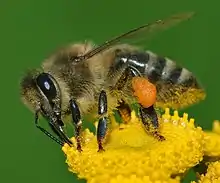abella
See also: Abella
Aragonese
Etymology
From Vulgar Latin *apicla, from Latin apicula, diminutive of apīs, of uncertain origin.
Catalan
Etymology
From Old Occitan [Term?], from Vulgar Latin *apicla, from Latin apicula, diminutive of apīs, of uncertain origin.
Pronunciation
Galician

Abella
Etymology
From Old Galician and Old Portuguese abella (13th century, Cantigas de Santa Maria), from Vulgar Latin *apicla, from Latin apicula, diminutive of apīs, of uncertain origin. Cognate with Portuguese abelha and Spanish abeja.
Pronunciation
- IPA(key): /aˈβeʎa̝/
Derived terms
- Abella
- Abellal
- abellariza
- Abelleira
- abelleiro
References
- “abella” in Dicionario de Dicionarios do galego medieval, SLI - ILGA 2006-2012.
- “abella” in Xavier Varela Barreiro & Xavier Gómez Guinovart: Corpus Xelmírez - Corpus lingüístico da Galicia medieval. SLI / Grupo TALG / ILG, 2006-2016.
- “abella” in Dicionario de Dicionarios da lingua galega, SLI - ILGA 2006-2013.
- “abella” in Tesouro informatizado da lingua galega. Santiago: ILG.
- “abella” in Álvarez, Rosario (coord.): Tesouro do léxico patrimonial galego e portugués, Santiago de Compostela: Instituto da Lingua Galega.
Old Portuguese
Etymology
From Vulgar Latin *apicla, from Latin apicula (“small bee”), diminutive of apis (“bee”), of uncertain origin.
Pronunciation
- IPA(key): /a.ˈbe.ʎa/
Related terms
This article is issued from Wiktionary. The text is licensed under Creative Commons - Attribution - Sharealike. Additional terms may apply for the media files.